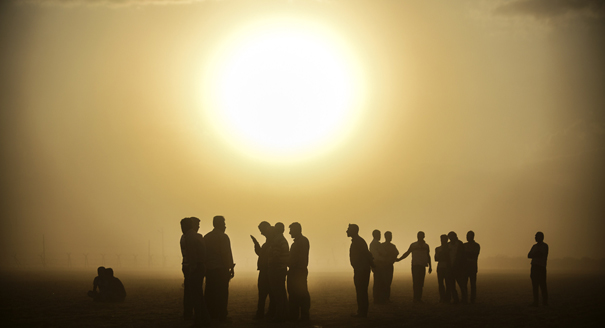Mina al-Oraibi | Editor in chief of The National newspaper in Abu Dhabi
The Arab world has had more than its fair share of violence in the last few years. My biggest worry is the escalation of violence and a new turn of war destroying more lives. With the war in Syria, heightened tensions between the United States and Iran, Tehran’s insistence on expanding its influence in the region, Hezbollah’s advances in Lebanon’s elections, and Israel’s growing number of strikes in Syria, the stage is set for further violence. Iran and Israel are unlikely to go to war within their borders, so a confrontation in Syria or Lebanon is more likely. Such a confrontation could then escalate and drag in various sides, with no end in sight.
Heated rhetoric can develop into armed clashes in an environment that is highly militarized. Israeli strikes on Syria have not been met with a response, further emboldening Israel. Iranian support for expanded Hezbollah activities and those of other militant groups in Syria and threats of action against Israel could spiral into further violence. While seven years of war in Syria have left some believing more violence won’t make much difference, the flames of war could expand to burn more people and communities. An Iranian-Israeli confrontation, likely on Arab territories, could spiral out of control. The failure of regional and international actors to rein in current confrontations is proof that a wider war would have few actors actively capable or willing to end it.
Kate Seelye | Vice president at the Middle East Institute in Washington, D.C.
I was in Beirut in 2006 when Hezbollah kidnapped two Israeli soldiers along the Lebanese-Israeli border, triggering an unexpected 34-day war at the start of Lebanon’s summer season. American diplomatic efforts helped bring an end to that short but destructive conflict. Today, strong U.S. engagement in the Middle East seems like a relic from the past. Instead, the Trump administration’s unilateral withdrawal from the Iran deal has emboldened Israel and its Sunni allies, who see an opportunity to weaken the Tehran government. They’re understandably unhappy with Iran’s spreading regional influence, its presence in Syria, and Hezbollah’s 100,000 rockets trained on Tel Aviv.
But as Israel learned in its 2006 war, there is no easy victory to be had. Any military effort to weaken Tehran and its Lebanese proxy—even with the backing of the U.S. and Gulf allies—is likely to be met with a barrage of missiles aimed at Israeli citizens, Gulf oil installations, and U.S. military bases. None of the key regional players claims to want a war. But the truth is that a hot summer looms and potential triggers for war abound. Without strong global leadership to mediate and deconflict, my greatest fear is of an Israel-Iran-Hezbollah skirmish that starts in Syria, spills over into Lebanon, and spirals beyond control.
Ziad Majed | Associate professor at the American University in Paris, author in 2014 of Syrie, La Révolution Orpheline, or “Syria, The Orphaned Revolution,” and co-founder, then coordinator, of the Arab Network for the Study of Democracy
I worry about a new Israeli war on Lebanon, that would follow an escalation between Israel and Iran in which Hezbollah would be involved. Such a war could be much more devastating for Lebanon than the war of 2006, with less international pressure on Israel to limit its attacks, and with huge destruction in infrastructure and in residential areas. Internal displacement, economic and financial difficulties, and a lack of funds for reconstruction might later lead to a series of crises in the country with very few mechanisms and capacities to contain or resolve them.
Michele Dunne | Director and senior fellow in the Carnegie Middle East Program
What worries me most about summer 2018 in the Middle East is escalating tension in the Levant, including the possibility that Israel will fight on two or even three fronts at once. It is all too easy to imagine another war in Gaza, where neither the Palestinian inhabitants—whose conditions have still not recovered from the 2014 war—nor the Hamas leadership have much to lose in trying to change the miserable status quo. The Syria war seems to be moving into a new phase, in which the devastated country becomes a stage on which regional powers, particularly Israel and Iran, play out their conflicts more directly, the only predictable consequences being more Syrian suffering. Lebanon too is far from safe, as Israel might strike Hezbollah’s worrying capabilities. Where will the steadying hand come from to prevent or resolve such conflicts? Sadly, not from the United States.








